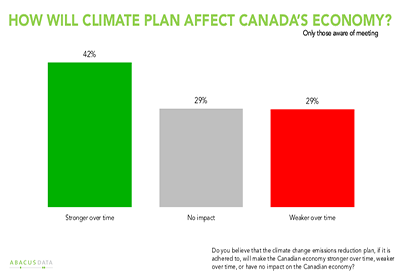Canadians React Positively to National Plan

January 25, 2017
Julia Kilpatrick
Although some provincial premiers have expressed concerns about the economic impacts of taking action to cut carbon pollution, a recent poll shows a strong majority of Canadians do not share those concerns.
Canada’s new national climate plan, released December 9, 2016, contains commitments to build clean energy infrastructure, including transmission lines, electric vehicle charging stations, and ultra-efficient buildings. To meet these commitments, the federal provincial and territorial governments will need to dedicate funding to these priorities in their budgets.
The public opinion research found that roughly 20 million Canadian adults (69%) heard something about the recent First Ministers’ Meeting on climate — including 9 million who heard either a lot or a fair bit about it. Among those who were aware of the meeting, which resulted in the adoption of a new national plan to tackle climate change and spur clean energy, reactions to the outcome were broadly positive, with little evidence of anxiety. For example:
- people were more likely to have a positive than a negative reaction to the emissions reduction plan agreed to by the majority of the premiers, by a margin of two to one
- by a similar margin, people were more likely to approve than disapprove of how the prime minister handled his responsibilities
- while critics of climate policies often cite the potential for economic risk, that argument resonates with only 29% of those surveyed. In comparison, 42% think the measures in the national climate plan will make Canada’s economy stronger over time
These results come from a survey of 1,848 Canadians conducted December 12 to 14, 2016, by Abacus Data at the request of Clean Energy Canada. The survey measured Canadians’ views of climate and clean energy policy issues, including the new national plan, the Pan-Canadian Framework on Clean Growth and Climate Change.
Support for transitioning from fossil fuels
The survey found that 70% of Canadians want the country to “shift its energy use as quickly as possible to cleaner, lower-carbon sources of energy and away from fossil fuels.” Just 30% said they felt it was “better for Canada to stick with mostly fossil fuel energy for a long time to come.”
In every region but Alberta, a majority favours a transition from fossil fuels. In Alberta, opinion is evenly divided. The overwhelming majority (82%) of Canadians under 35 favour a shift as quickly as possible.
2017 federal budget implications
To deliver on the new national climate plan, the next federal budget will need to include funding for initiatives to reduce carbon pollution. The survey shows that a large majority of Canadians support or would accept allocating funding in the 2017 federal budget to a range of clean energy priorities, including:
- incentives to help people make their homes more energy efficient
- building power lines between provinces to make renewable electricity more available
- installing electric vehicle charging stations near highways, cities and towns
Support for these potential budget measures cross all regions of the country, age groups, and partisan supporters.
How Canadian and U.S. energy priorities compare
Canada’s recent efforts to reduce carbon pollution and transition to clean energy contrast with U.S. President Donald Trump’s approach, which includes plans to undo much of the Obama Administration’s climate and clean energy policy as well as new support for fossil fuel production. Critics of the Canadian federal government’s climate plans have pointed to Trump’s energy agenda as a risk to Canada’s objectives, and as a reason to slow the transition to clean energy.
The survey found that Canadians’ response to Trump’s energy agenda is very different. Fully 49% of respondents said that Donald Trump’s election makes them more inclined to want a clean energy transition for Canada. Another 34% said the future U.S. president has no effect on their views. Just 17% say that having Trump in the White House makes them more inclined to think Canada should continue to rely on fossil fuels.
Survey participants were also asked about a number of potential clean energy investments that the federal government could make, and found the overwhelming majority of respondents either support or would accept having these investments included in the next federal budget. Support for these potential budget measures crosses all regions of the country, age groups, and partisan affiliations. For example,
- at least two-thirds of respondents favour incentives that encourage people to make their homes more energy efficient in every region of the country. Few oppose this idea outright.
- funding to build more power lines between provinces in order to increase the use of renewable electricity finds majority support in every region. Only 3% are opposed.
- there is also broad support for incentives to encourage people to purchase electric vehicles and for funding to increase the number of electric vehicles charging stations. A majority of Canadians in every region favour or can accept the proposals, as do voters of every major political party.
Support for Canada’s transition to clean energy
Over the longer term, achieving the climate goals that Canada has committed to means moving from fossil fuels to clean energy as a source of power across the economy. In the building sector, more efficient construction means that homes can be heated and cooled with clean power. In the transportation sector, for example, we’ll need to shift from cars fuelled with gasoline to those that run on clean electricity.
The survey found a strong majority of Canadians support a rapid shift away from fossil fuels. Seventy per cent of respondents either strongly or somewhat agree with the premise that “Canada should shift its energy use as quickly as possible to cleaner, lower carbon sources of energy and away from fossil fuels.” Just 30% said they felt it was “better for Canada to stick with mostly fossil fuel energy for a long time to come.”
Julia Kilpatrick leads the development and execution of Clean Energy Canada’s strategic communications and media engagement. Before joining Clean Energy Canada, Julia spent six years in various leadership roles at the Pembina Institute. Prior to that, she worked as a broadcast producer, reporter and writer at CBC Ottawa, the Montreal Gazette and other news outlets. She holds a master’s in journalism from Carleton University and an honours B.A. in English literature and environmental studies from the University of Ottawa.
This article was originally published online by Clean Energy Canada: http://cleanenergycanada.org/poll-canadians-react-positively-to-national-climate-plan/. It has been lightly edited and supplemented by a Clean Energy Canada backgrounder: http://cleanenergycanada.org/wp-content/uploads/2016/12/Backgrounder-FMM-poll-12192016-Web.pdf.

















